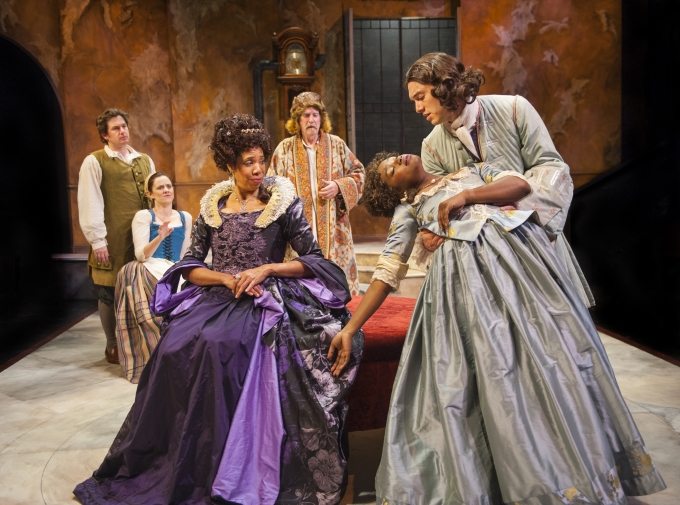By Charles Brousse
The good news is that Berkeley’s intimate Aurora Theatre is currently hosting one of the most sublime evenings of classic farce that the Bay Area has seen in years. When I began this column I was about to add the bad news that unless you already have tickets, you might not be able to get in before David Ives’ The Heir Apparent closes on May 15. Then, word came that the show is being extended a week, to May 22. Better hurry, though, because the venue is small and unclaimed seats are going fast.
Ives is a genuine American literary phenomenon. Born in 1950 and educated in Catholic schools, he was heading toward a career in the priesthood when he decided in his 20s that he didn’t have much to say about God, but a lot to say about people’s lives. Ever since, there has been a cascade of words: Novels, short stories, children’s fiction, film scripts, opera librettos, books for musicals, poetry, non-fiction articles for national magazines … The list is endless.
Probably, his best-known works have been for the stage. These include a pair—All in the Timing (six thematically linked one-acts that had their debut New York run in 1993-94) and Venus in Fur (full-length, 2013-14); both, excepting Shakespeare, were the most frequently produced plays around the country (including the Bay Area) during the seasons mentioned.
While those are originals, Ives has also frequently adapted classic plays for modern audiences. The Heir Apparent’s ancestry stretches through thousands of years of Western theatrical history, from Ancient Greece’s Aristophanes, to ancient Rome’s Plautus, to Renaissance Italy’s commedia dell’arte, to Moliere and the French school, to Jean Francois Regnard, whose boisterous, overtly scatological Le Légataire Universel (1708), is cited by Ives as the basis for what he calls his “transladaptation.” Same situations, similar characters, but they are accompanied by a new rhymed script that is generously sprinkled with contemporary references and potty-mouthed asides. Without doubt, a few fall flat, but many are thigh-slapping hilarious, and even the groaners add to the pleasant sensation that we have entered a parallel, highly entertaining absurd universe.
The setting is early 18th century Paris. Crusty septuagenarian Geronte (Julian López-Morillas in a role that fits him like a second skin) is nearing his final days on earth—or so it seems to those who have their eyes fixed on his considerable fortune. In a nicely detailed performance, Kenny Toll is Eraste, Geronte’s nephew, who dreams of inheriting his uncle’s millions so he can persuade his fortune-hunting mother Madame Argante (an imperious Elizabeth Carter) to bless his marriage to the lovely Isabelle (Khalia Davis). A pair of servants, Lisette (Katie Rubin) and Crispin (Patrick Kelly Jones) also share the dream, but for them it’s that when the old man finally gives up the ghost, a few scraps from the estate settlement will enable their own union.
While Geronte’s continual complaints about the state of his bowels, lungs and heart raise everyone’s hopes, he stubbornly recovers from every episode until, one glorious day, Lisette reports that he died in his sleep. The ensuing celebration is cut short by the realization that their reluctant benefactor, irascible to the end, has left no will. A dwarf-sized lawyer named Scruple (Lawrence Radecker, who, to fit the character’s description, is compelled to shuffle along on his knees) is summoned, and Crispin, disguised as Geronte, requests that he draft a will that will satisfy the group’s aspirations. Just then …
No spoiler. All of the forgoing nonsense would fail if Aurora’s production lacked a director and actors who didn’t know how to present classic farce. Fortunately, Josh Costello’s staging is impeccable and the whole ensemble performs with the energy and craft that the play requires.
As for David Ives, scuttlebutt has it that his next project is a collaboration with Stephen Sondheim on a musical based on the surreal visions of Spanish film auteur Luis Buñuel. Can’t wait.
NOW PLAYING: The Heir Apparent runs through May 22 at the Aurora Theatre, 2081 Addison St., Berkeley; 510/843-4822; auroratheatre.org.








